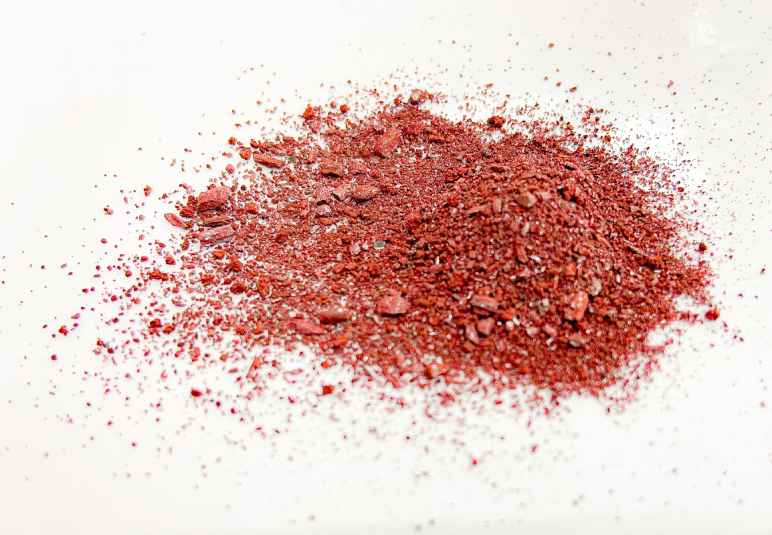
This is Mercury Sulphide, a red crystal used to make ornaments and not the mythical Red Mercury for which the naive part with tidy sums of money. [Stock Image]
For centuries fortune hunters have strived to find Red Mercury just as they did with the elusive fountain of youth.
Red Mercury, which doesn’t exist, is fallaciously believed to have unique healing capabilities, nuclear properties and even alchemy abilities.
The myth of a fabulously valuable mineral called Red Mercury has been around for ages. It is, therefore, not surprising to find on-line adverts for the mineral.
YouTube videos have claimed that the “magical” element has vampire properties of not showing any reflection when placed in front of a mirror.
Amid all these tales of Red Mercury, one thing is for sure. It doesn’t exist.
In 2015, the New York Times reported that the Islamic State members were arrested in Turkey attempting to buy Red Mercury. Why? Because the terrorists believed the mythical substance had nuclear capabilities.
In the late 80s, Mark Hibbs, a correspondent for nuclear energy publications heard rumours that a powerful unknown nuclear material was being created in Soviet labs and offered for sale in black markets. Its name? Red Mercury.
It was believed that a small size of the material could cause a powerful explosion which created both fear and demand for a product no one had seen.
On the US Department of State website, a speech was given by John R Bolton, the then Secretary for Arms Control and International Security, who said that there is no such thing as Red Mercury. That was after terrorist groups fell prey to scammers who had tried to sell them something called Red Mercury.
Others believed that due to its ‘Dracula properties’ it could be found in bat-nests. The weird thing about this version of the story that sent many people hunting for bats is that bats don’t have nests, reports the BBC.
Evidence of this Dracula ability has been shared on YouTube showing how the Red Mercury in a tube reflects a clear empty tube. Indian police in a counter YouTube video has shown how the con-artists execute the prank and that the element in the tube isn’t what they say it is.
An aluminium foil facing the mirror and then the red substance facing the camera give an illusion of a clear tube.
According to the BBC, another myth surrounding the fake element is that it can summon jins which is Arabic for supernatural beings.
In 2009 it was widely believed in Saudi Arabia that one could find the element inside vintage sewing machines. This led the ordinary household machine to be sold for more than a million Kenya shillings.
In Uganda, a fraudster was purported to have a German-made stove that dated back to 1914 and was made by a King Keizer (sic) (also doesn’t exist) and could change water to colour red and a blue pen to red as well.
Another such tale led to two suspects being arrested in Kenya. The suspects were selling what they claimed was a German stove made of gold and valued at Sh3 million.
Websites have sprung up selling the same mystical substance with prices starting at Sh 80,000, defrauding the gullible.
David Adede, a geologist and director of Rocklink, explains that many people have been duped into buying “Red Mercury”.
“There is nothing like Red Mercury. No science supports the existence of such a substance. The only thing close to that is Mercury sulphide, which is a red crystal used as an ornament,” says Adede.
The geologist explains that many people have asked him if the element is real after being defrauded.
In a ruling made in the High Court in 1984, a Congolese by the name Mulumba Kasongo l was jailed for four years in a Red Mercury deal but was released on appeal by a judge who formed the opinion that it had not been demonstrated that Kasongo was sure that Red Mercury doesn’t exist and therefore didn’t have a guilt frame of mind.
The complainant, A Kenyan businessman, averred that he believed that what he purchased was the mythical substance but it was later established that it was red paint.
In 2014, four suspected conmen were arrested in Nyandarua after defrauding unsuspecting residents of millions of shilling with the promise of supplying them with ‘powerful Red Mercury’.
Despite widespread warnings from authorities about his hoax, websites and social media pages claiming to sell this ‘magical’ element have made the fight against misinformation very difficult.
As the world continues sharing information through social media in the age of fake news and increased conspiracy theories, Red Mercury’s fame seems to be growing.
“People should be able to establish whether something is true or not before getting conned,” says Adede.
What about the real mercury?
Mercury is a shiny silvery liquid metal that is highly toxic and is the only metal that exists in a liquid state at standard temperature and pressure.
It is mainly used in thermometers, float valves, fluorescence lamps and in the production of liquid mirrors. If it was that expensive thermometers would be so expensive that they would be locked in safes and only affordable by the rich and heavily funded institutions.
Mercury is harmful. It damages the brain, heart, kidneys, lungs, and immune system and the central nervous system.
 The Standard Group Plc is a multi-media organization with investments in media platforms spanning newspaper print
operations, television, radio broadcasting, digital and online services. The Standard Group is recognized as a
leading multi-media house in Kenya with a key influence in matters of national and international interest.
The Standard Group Plc is a multi-media organization with investments in media platforms spanning newspaper print
operations, television, radio broadcasting, digital and online services. The Standard Group is recognized as a
leading multi-media house in Kenya with a key influence in matters of national and international interest.











